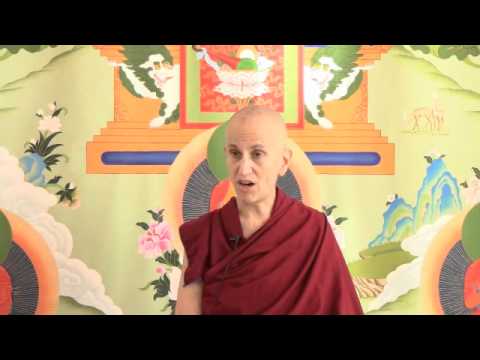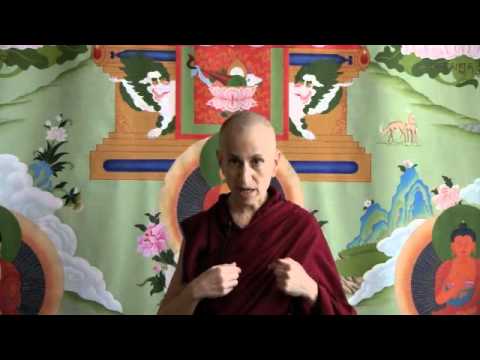Generating bodhicitta
This talk was given during the White Tara Winter Retreat at Sravasti Abbey.
- Why we generate bodhicitta
- The disadvantages of excessive self-concern
- Actualizing our aims of love and compassion
White Tara Retreat 05: Generating bodhicitta (download)
After taking refuge, the next thing we do is generate bodhicitta. Bodhicitta is not simply love and compassion. It is definitely based on that, but bodhicitta goes beyond love and compassion to actually motivate us to become fully enlightened Buddhas for the benefit of all sentient beings, including this one [referring to the Abbey cat in her lap].
They say bodhicitta is as if you churn the Buddha’s teachings: the cream, the best part is the bodhicitta. It is the richest part of the Buddha’s teachings. They say that all happiness comes from bodhicitta in the sense that whatever virtue we have, whatever realizations beings attain, it all comes through the Buddhas having taught us how to create virtue and how to follow the path. Why is it that the Buddhas teach us this? It’s due to their bodhicitta. We want to generate the bodhicitta so that we can become like the Buddhas and do the Buddhas’ activities. Whereas refuge shows us what direction we are going in spiritually, bodhicitta shows us why we are going in that direction.
Disadvantages of excessive self-concern
Most of the things we do in our life, our motivation is for ourselves; or if not directly for ourselves then towards those we are attached to. Most of our motivations, most of our efforts are directed towards “me, I, my, and mine.” To generate bodhicitta we have to completely reverse that and turn it around. We don’t generate bodhicitta because, “I want to become a Buddha so that I’m a big deal, and I’m fully accomplished, and people give me some flowers and some apples sometimes.”
We want to really see the disadvantages of the selfish mind and how it keeps us trapped. It makes us miserable in this life and makes us do actions that harm others and harm ourselves. This self-centered thought creates so much destructive karma, which ripens in our miserable situations.
Actualizing our love and compassion
By seeing this very clearly, we make a strong determination not to follow after the self-centered thought. Instead we look at other sentient beings as kind, as helpful, and seeing how our whole life depends upon them. Therefore, we want to be of benefit to them. We want to generate love (the wish for them to be happy) and compassion (the wish for them to be free of suffering). Therefore to actualize the aims of our love and compassion, to bring happiness, and help them abandon suffering, we have to become a Buddha. Only as a Buddha will we have the wisdom, the compassion, the skill, the means, the power and so forth, to actually be able to do that.
We generate that bodhicitta motivation at the beginning of our practice of Arya Tara. We generate it every morning when we wake up, also at the beginning of any meditation session, at the beginning of any activity that we deeply engage in. In fact, as much as possible to go through our life just generating bodhicitta would be very effective for ourselves and for others.
Venerable Thubten Chodron
Venerable Chodron emphasizes the practical application of Buddha’s teachings in our daily lives and is especially skilled at explaining them in ways easily understood and practiced by Westerners. She is well known for her warm, humorous, and lucid teachings. She was ordained as a Buddhist nun in 1977 by Kyabje Ling Rinpoche in Dharamsala, India, and in 1986 she received bhikshuni (full) ordination in Taiwan. Read her full bio.


